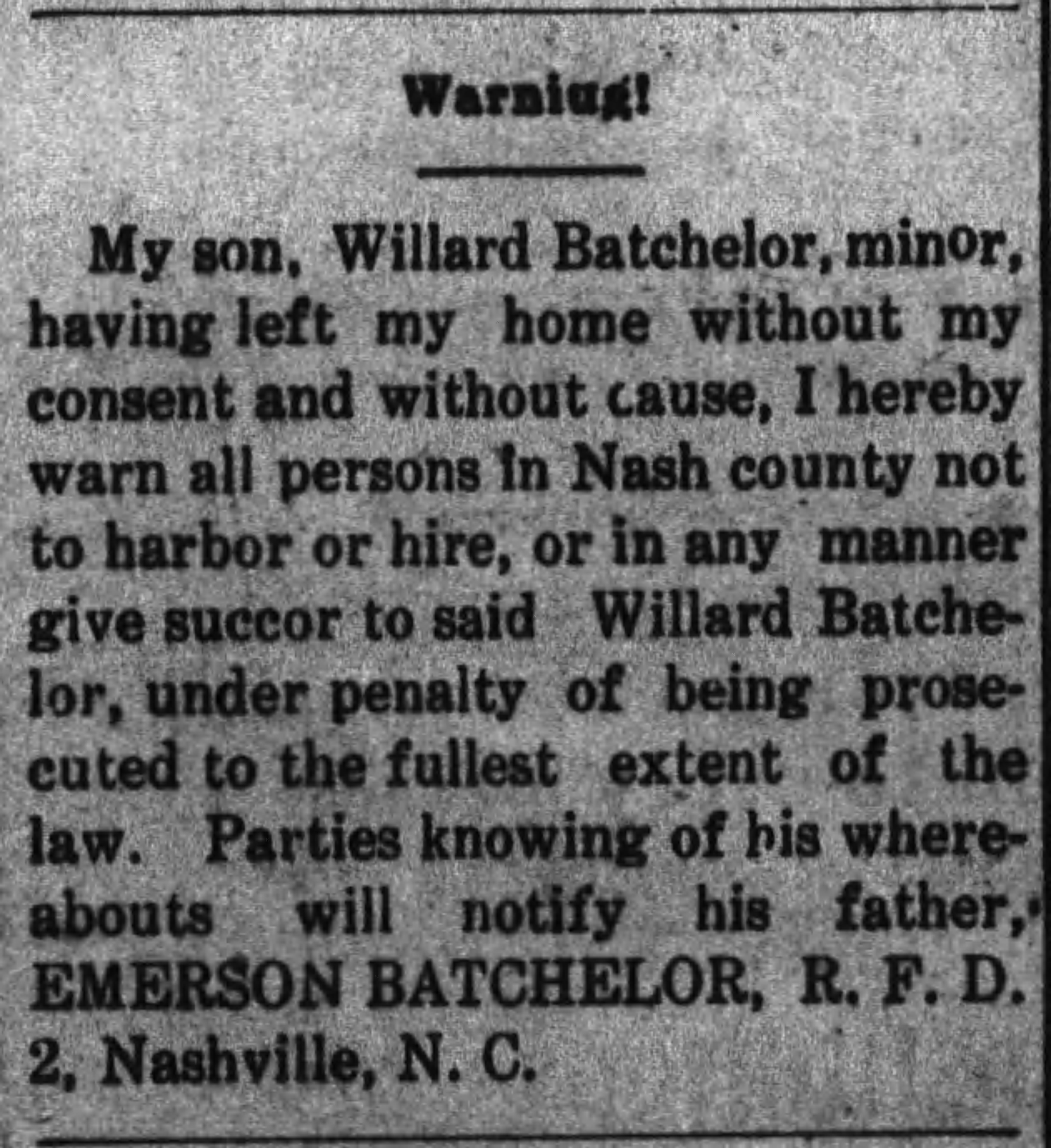Author: Matthew M. Peek and Caroline Waller, Military Collection
John Willard Batchelor (who went by “Johnnie” and more commonly “Willard”) was born in February 24, 1896, in Nash County, N.C., to Emerson Neverton and Flossie Batchelor. Emerson Batchelor was married to Mary Williford Burgess on May 3, 1883, in Nash County. It is unknown what happened to Mary Batchelor, but she either died or the couple divorced by 1893. On November 23, 1893, 30-year-old Emerson Batchelor married 17-year-old Flossey [Slone] Batchelor in Nash County. By 1900, the Batchelor family—which consisted of seven children under the age of 16—were living in the Nash County Alms House as a poor family, while Emerson Batchelor worked as a farmer.
 By 1910, the Batchelor family was living on their own farm in Nash County, where John Batchelor helped his father on the farm. At the time of his federal draft registration for World War I, John Batchelor was living in Wilson, N.C., and was working at Dildy & Agnew Company. That company sold hardware, agricultural implements, and building material, and was one of the largest companies in Wilson at the time. John Batchelor was inducted for military service in WWI in the U.S. Army on May 25, 1918.
By 1910, the Batchelor family was living on their own farm in Nash County, where John Batchelor helped his father on the farm. At the time of his federal draft registration for World War I, John Batchelor was living in Wilson, N.C., and was working at Dildy & Agnew Company. That company sold hardware, agricultural implements, and building material, and was one of the largest companies in Wilson at the time. John Batchelor was inducted for military service in WWI in the U.S. Army on May 25, 1918.
Batchelor attended basic training at Camp Jackson, S.C., where he was assigned to the 156th Depot Brigade until June 28, 1918. On that day, he was transferred to Company L, 323rd Infantry Regiment, 81st Division, where he remained until August 24, 1918. Batchelor left from the United States aboard a troop transport ship for Europe on July 31, 1918. On August 24, 1918—after arriving in France—Batchelor was transferred to the 168th Infantry Regiment, 42nd Division, which was commonly referred to as the “Rainbow Division.” Batchelor served as a rifleman with the 168th Infantry, first seeing combat in Europe at the Battle of Saint-Mihiel in September 1918.

He later fought in the Meuse-Argonne Offensive, where he contracted Spanish influenza, and was sent to a French hospital for treatment. While Batchelor was recuperating in France, he learned of the Armistice on November 11, 1918, and the war’s end. He would eventually return to his unit, remaining with them on occupation duty in Europe. On January 27, 1919—in anticipation of his eventual return to the U.S.—Batchelor was transferred to the Camp Wadsworth Detachment of the 337th Infantry, 85th Division, U.S. Army. Batchelor arrived back in the United States aboard a troop transport ship from France on April 7, 1919. He was honorably discharged from the U.S. Army on April 15, 1919, with the rank of Private.
After the war, Batchelor returned to North Carolina, and worked as a farmer. He married Polly Ann Green in Nash County on December 24, 1923. By 1930, Batchelor was living in Nash County, N.C., and was farming there. By 1940, Johnnie Batchelor, his wife, and their six children were living in the small town of Stantonsburg in Wilson County, N.C., where he worked as a farmer for Lonnie Harrell. John W. Batchelor Sr. died on July 16, 1998, in Raleigh, N.C., and was buried in Maplewood Cemetery in Wilson, N.C.
The State Archives of North Carolina has a veterans oral history interview with John W. Batchelor, conducted in December 1996 by Alexander McLean and current North Carolina Museum of History Deputy Director Jackson Marshall. You can read about what Batchelor discusses in the attached oral history interview summary, or visit the State Archives' Search Room to listen to a reference disc containing the interview (MilColl OH 53, John W. Batchelor Interview, interview runtime: 46 minutes, 6 seconds).
This blog post is part of the State Archives of North Carolina’s World War I Social Media Project, an effort to bring original WWI archival materials to the public through the North Carolina Department of Natural and Cultural Resources’ (NCDNCR) various social media platforms, in order to increase access to the items during the WWI centennial celebration by the state of North Carolina.
Between February 2017 and June 2019, the State Archives of North Carolina will be posting blog articles, Facebook posts, and Twitter posts, featuring WWI archival materials which are posted on the exact 100th anniversary of their creation during the war. Blog posts will feature interpretations of the content of WWI documents, photographs, diary entries, posters, and other records, including scans of the original archival materials, held by the State Archives of North Carolina, and will be featured in NCDNCR’s WWI centennial blog.

